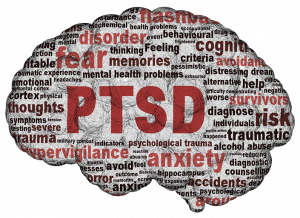Post Traumatic Stress Disorder, or PTSD, is a mental health condition that is experienced after a person experiences one or more traumatic events. While PTSD is most commonly associated with veterans and military service members, it is possible for people who have never served in the military to experience PTSD. Here are the five primary symptoms that help to categorize and diagnose PTSD. Please remember that only a medical professional can make an actual diagnosis, even if you experience some or all of these symptoms.
1. Extreme and Intrusive Thoughts
Someone who has PTSD may experience extreme thoughts and intrusive thoughts. Their thoughts might be aggressive or inappropriate. Their thoughts could be triggered by experiencing something similar to the event that caused the PTDS, or they could have no trigger.
Negative or anger-inducing thoughts brought on by PTSD can cause a change in a person’s mood.
2. Change in Mood
People with PTSD have expressed various mood changes. These changes could be slight or severe. Mood changes can also happen if the person goes through a triggering experience. Typically, the mood changes are unwanted.
The mood changes could promote the person with PTSD to engage in risky or out-of-character behaviors. There is also a higher likelihood that the person experiences mood disorders, like depression or anxiety.
 3. Heightened Sense of Anxiety
3. Heightened Sense of Anxiety
People with PTSD tend to have a heightened sense of anxiety. The anxiety experienced might be worse than the anxiety experienced before the traumatizing event. The overall feeling of anxiety might ebb and flow over time, but when triggered, a person’s anxiety can become overwhelming and uncontrollable. Triggering events can happen because the person experiences a negative thought, flashback, or event. The heightened sense of anxiety can cause situational or social avoidance.
4. Situational Avoidance
When a person has PTSD, they might avoid certain situations that make their PTSD or anxiety worse. People with PTSD want to avoid situations that trigger negative feelings, thoughts, or emotions. Here are some situations a person with PTSD might want to avoid:
- Public places, like the grocery store
- Crowded events, like a concert
- Loud noises, like a fireworks show
- Dark places, like a movie theater
- The area the trauma occurred
In addition to avoiding certain situations, people with PTSD might change their habits or routines. Even when avoiding situations and changing habits or routines, a person with PTSD can still experience nightmares and flashbacks.
5. Nightmares and Flashbacks
It is common for people with PTSD to experience nightmares and flashbacks, no matter how they change their habits, scenery, or activities. Someone with PTSD might experience more vivid or lifelike nightmares. Nightmares can cause someone to have a restless sleep. Flashbacks can occur when a person with PTSD is awake. A flashback is like experiencing the traumatic event all over again.
What Should You Do If You Have PTSD?
If you believe you have PTSD, you should talk to your doctor. They might suggest taking medication, seeing a therapist, or participating in a PTSD research study. A PTSD research study will provide you with medical care and possibly new or investigational therapies. Sometimes the research study you participate in will compensate you for your time and travel.
